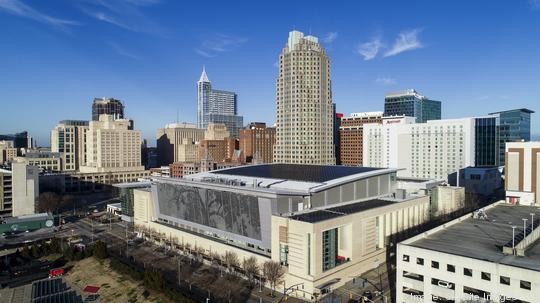
A young Triangle nonprofit is working with local businesses to promote a more sustainable economy.
Circular Triangle was formed a little over two years ago out of a monthly breakfast group that met to discuss ways to promote sustainability in the business community. The group members felt so strongly about their mission that they turned it into a nonprofit with the goal of completing projects and generating interest in a more circular economy, said Kristin Schilling, a member of Circular Triangle.
Schilling said the idea of a circular economy centers on reusing – instead of wasting – resources
“The linear economy depends upon taking resources, making things, and then wasting them,” she said. “A circular economy depends on reducing the quantity of resources that we take and reusing what we take and then creating waste streams that create re-generation, instead of just going into the landfill.”
Circular Triangle’s mission is cross-sector — they aim to connect people in both the public and private sectors and the community at large. The organization, run entirely by volunteers, has already worked on a variety of projects.
A project that stood out to Schilling was a collaboration between Circular Triangle, Durham-based Haven Design Build and master's students at Duke University. The students reviewed Haven's waste management process and came up with ideas to reduce the amount of construction waste ending up in landfills.
According to Circular Triangle, construction is one of the most waste producing sectors — the construction industry consumes around 50 percent of all raw materials and creates around 20 percent of the waste. Therefore, working with construction companies and developers is a central part of Circular Triangle's mission.
Another large project the organization is working on is a partnership with Durham Land Trustees, an organization that buys land in order to provide affordable housing options. The project's goal is to build the first Living Building Challenge certified affordable housing complex in North Carolina. It will be located on Alma Street in East Durham.
The Living Building Challenge certification is for buildings constructed using sustainable processes. Schilling said the certification requirements are "quite rigorous" compared to other sustainable building certifications.
Schilling said Circular Triangle is also currently creating a "circular business pledge," that when completed, will serve as a resource for businesses looking to change their processes to be less wasteful.
In addition to collaborations with businesses, Circular Triangle also advocates in the public-sector by building relationships with local government leaders and officials.
Schilling said Circular Triangle's goal for the future is to ultimately serve as a space for collaboration, where businesses in various sectors can brainstorm and collaborate on projects.
"One of our big goals for the coming years is to try and be a space where the community can think up good ideas and then we find homes for them," Schilling said. "We would love to create room for different people in different sectors to come together and say, 'I’ve had this really good idea that I think would really help the Triangle to move toward a healthier future, how can I get traction on this,' because we have a constantly growing network of people who are interested in this."